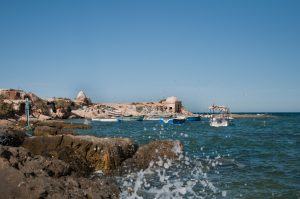 News about shipwrecks, returns or disembarkation of boats carrying migrants and refugees across the Mediterranean Sea is reported at least weekly, but more often daily, in international newspapers. This often includes loss of life, adding up to hundreds of people every year. The constant flow of information can numb one to the sheer frequency and numbers of deaths and missing people at sea. In the wake of the new Migration Pact proposed by the European Commission, experts warn that some EU policies may increase the risk for migrants and refugees.
News about shipwrecks, returns or disembarkation of boats carrying migrants and refugees across the Mediterranean Sea is reported at least weekly, but more often daily, in international newspapers. This often includes loss of life, adding up to hundreds of people every year. The constant flow of information can numb one to the sheer frequency and numbers of deaths and missing people at sea. In the wake of the new Migration Pact proposed by the European Commission, experts warn that some EU policies may increase the risk for migrants and refugees.
The data on deaths at sea
According to the Missing Migrants Projects of the International Organization for Migration (IOM), at least 783 people died in the Mediterranean in 2020 of a total of 90,335 people who attempted the crossing at least once; trying to reach Spain, Italy, Greece and Cyprus. These figures are lower than the 2019 numbers, which amount to 1.332 and 171.769 migrants and refugees respectively over the same period. However, the ratio of migrants and refugees who attempted the crossing and lost their lives has increased from 0.8% to 0.9%. This figure includes arrivals by sea in Spain, Italy, Cyprus and Greece, as well as arrivals by land in Spain and interceptions by the Tunisian National Guard and the Turkish and Libyan Coast Guards.
From a geographical point of view, the Central Mediterranean route remains the one with the greatest number of people who have lost their lives: 573 out of a total of 783 deaths in the first ten months of 2020 occurred along this route. When adding the Western Mediterranean route (to Spain) the number rises to 683. This shows how departures from the coasts of North Africa remain the most dangerous for the fate of migrants who, for a large part, are refugees under international law. Out of the total number of bodies found in Mediterranean waters, the IOM estimates that about 247 came from sub-Saharan Africa, 12 from the Horn of Africa and 200 from North Africa.
European policies on migration
Gillian Triggs, Assistant High Commissioner for Protection at The UN Refugee Agency (UNHCR), stated in May 2020: “[…] UNHCR is urging stronger intra-EU solidarity with the EU Mediterranean coastal States receiving refugees and migrants and calling for other Member States to show greater responsibility-sharing in the form of relocation support. Collective efforts on both sides of the Mediterranean Sea are essential to save lives at sea.” These efforts have partly been taken up in the New Pact on Migrations and Asylum, where a new solidarity mechanism is being developed. This system is supposed to provide support for rescue operations, as well as the reception of newcomers OR assistance to return operations. It also includes cooperation with non-EU countries.
In this context, bilateral agreements between Member States and countries such as Tunisia and Morocco have been implemented. However, these seem not to have improved the conditions of migrants and refugees in terms of recognition of refugee status and resettlement. In fact, as stated in the OXFAM Italia report, despite the closure of land borders due to COVID-19, refugees continue to die at sea. The report also shows the inadequacy of the asylum and reception systems in Tunisia and Morocco. In addition, funding from Europe has not contributed to improved refugee and migrant rights. For example, arbitrary and violent refoulements to Algeria and Mauritania by the Moroccan authorities continue to occur, including vulnerable people such as pregnant women and children. Meanwhile in Tunisia, current legislation prevents irregular migrants from seeking asylum, and they are denied access to lawyers and interpreters.
In conclusion, despite the introduction of a new pact for migration and asylum and economic and operational support to North African countries, the total ratio of deaths at sea has increased over the years and seems unstoppable. If policies planned and supported by all member countries are not implemented, it will be difficult to stop this trend which is confirmed by independent data. Amnesty International, UNHCR, and other NGOs warn that protection of human rights of migrants and refugees will take a more ambitious plan by the EU.

